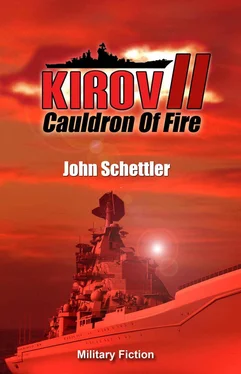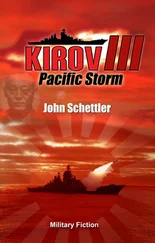“That I understand,” Rodenko argued. “But I see no controls at the helm for time displacement! How is it possible?”
“I said I don’t know,” said Fedorov. “Look—we won’t be able to sort through all of this any time soon. It took us days to realize what had happened the first time, but we may not have the luxury of time like that again. We need to be alert and ready, and must assume we are still not where we belong. If we have moved again, we need to find out where we are, because if we’ve landed back in the 1940s as before, then this could be a very dangerous place.” He pointed to the forward view pane. “Don’t be lulled by those nice calm seas and clear blue skies. The Mediterranean was a cauldron of fire during the Second World War, and we’ve sailed right into the middle of it. If I could only figure out the date and time…” He remembered his radio man and turned to that station, his eyes alight.
“Anything to report, Mr. Nikolin?”
“Nothing yet, sir. The band is all clouded over. I think I’m starting to get a signal, then I lose it. It comes and goes like that, but I get nothing clear enough to record.”
“Well, keep at it.” He surveyed the bridge, thinking what to do next. The situation had calmed for the moment, and he wanted to get below and see the damage first hand, but even more to get to the infirmary and see what the Doctor was calling about.
“We’ll sort out what has happened soon enough,” he concluded. “In the meantime I need to find the Admiral and give my report. Stay on that scope, Rodenko—all of you—be keenly alert now. And Mister Samsonov,” he warned, “we cannot afford to be caught by surprise again. I assess no blame here. None of us saw that plane until it was right on top of us. But don’t let another aircraft get within striking range of this ship, eh? If Rodenko finds anything and feeds you a contact, you have my permission to fire at will and shoot it down. I’m afraid the circumstances compel us to shoot first and ask questions later until we know what has happened and where we are.” He straightened his cap, resolved.
“And now, gentlemen, I must go below. Mister Rodenko—you have the bridge.”
“Aye, sir.”
~ ~ ~
He madehis way out the hatch and down the stairway to the decks below. Men saluted as he passed, to his uniform and rank if nothing else. They knew him as Fedorov, the young dreamer at navigation, lost always in his books when he wasn’t on duty, and always ruminating on the dusty pages of history past. Yet, with the rumors that had been circulating about the Admiral, they were glad, at least, to see a ranking officer in their midst. Karpov and Orlov were still locked up in the brig, and most of the other senior officers were on the bridge. Though many of the junior officers still thought of Fedorov as one of their own, the fact remained that he was now wearing three stripes and two pips of a Captain Lieutenant, and was designated Starpom , the First Officer of the Boat in authority beneath Admiral Volsky.
Down in the lower decks, the chief warrant officers, or mishmanyy , held sway, commanding the ranks of starshini below them, Chiefs and Petty Officers of various classes, down through Senior Seamen, though the bulk of the 750 man crew were still at the lowest navy rank, the matpoc who carried out all the daily tasks required to keep the ship running in good order. The men still had on their bright orange and yellow life vests and helmets, already hosing down and swabbing the decks where residual fire damage had occurred.
Fedorov saw where the worst of the attack had riddled an outer hatch with sharp punctures, the metal spraying inward as shrapnel to kill and wound several men in this compartment. Some of the overhead insulated piping and wire conduits that ran in cluttered runs along the roof had also been sheered to ribbons, and technicians were already at work there, cutting and replacing wire and nosing about in an electrical panel fuse box that was blackened with recent fire.
“How bad was it?” he asked a seaman where he worked.
The young man looked up at him, saluting when he saw Fedorov’s cap and shoulder insignia. Then he recognized the face, and half smiled in recognition. His eyes clouded over soon after. “There was a lot of shrapnel. We lost three men here,” he said: “Gorokhov, Kalinin and Pushkin. The rest weren’t too bad off. The starshina sent them to the sick bay twenty minutes ago.”
Fedorov knew one of the men well enough to take the news with a bit of a sting. He nodded, his features taut but controlled. “I’m off to see about them then,” he said.
“What was it, sir?” the seaman asked, his eyes wide.
“An aircraft of some sort. We haven’t sorted it out yet, but stand easy. Rodenko is on the watch and we are in no further jeopardy at the moment.”
“But what about the Admiral, sir? Is it true he was killed in the attack as they say?”
“Killed?” Fedorov tried to sound as if he knew what he was about, but the news shook him, and the look on his face could not conceal the emotion. “We have not heard that, seaman,” he said in a low voice, “but I will keep the ship informed. For now we can only carry on. As you were.”
Fedorov edged past the man into a long corridor and made his way quickly through the ranks toward sick bay. Along the way many men pressed him with questions, but he bid them to attend to their duties and hurried on, which did little to quell the anxiety that seemed to jangle the nerves of the whole ship’s crew now.
Killed? The thought of Volsky dead was leaden on him now. If that were so then it would all fall on his shoulders, the responsibility for commanding the entire ship and crew. In truth, he never wanted a command position, being content with his status as the ship’s navigator. Admiral Volsky had been a mentor, and almost a father to him. He listened to him, guided him, and was slowly easing him into his new role as Starpom these last days. He can’t be gone, thought Fedorov. He can’t! But if it were so he knew he would have to set an example for the others now. Volsky was the one great link that seemed to bind this crew together. They loved the man and would do anything for him, which is why Karpov’s betrayal and mutiny was doomed to fail from the moment he first planned it. But now…if the Admiral was gone…
What would the men think? They had been through a great deal these last days. Even the long, uneventful cruise across the Atlantic had filled them all with a sense of foreboding ever since they first made landfall on the Azores. Rumors quickly circulated that everyone was dead and there was nothing but burned out wreckage and fire scored bones left on the islands. When they finally entered the Mediterranean Sea and scouted north to Toulon and then down the coast of Italy, the men could finally see for themselves that the rumors were true. They had gathered in groups on the outer decks, clustering near the gunwales and railings to gawk at the destruction of Rome and Naples. It did little to improve morale. Were they the last survivors of a terrible war, they wondered? And what would become of them now?
At length Fedorov reached the sick bay, seeing two first class seamen leaving with a salute just as he arrived. One had a bandaged head and the other had his arm in a sling, but neither man looked seriously injured. He slipped through the hatch, catching a glimpse of three bodies shrouded in white sheets on the tables at the far end of the room. His heart leapt when he thought he might see the Admiral lying there but then Zolkin appeared from the next room with a wan smile. The bearded, bespectacled senior medical officer was a Captain of the second rank after his long career in the Russian Navy. He was, in fact, two ranks above Fedorov, though the medical branch was not in the operational arm of the service.
Читать дальше












